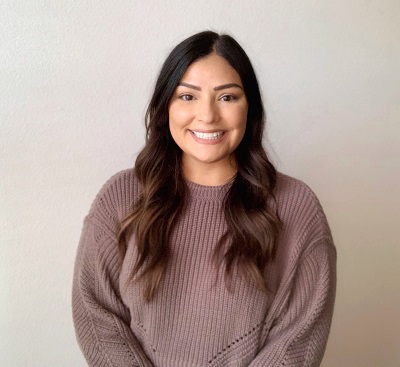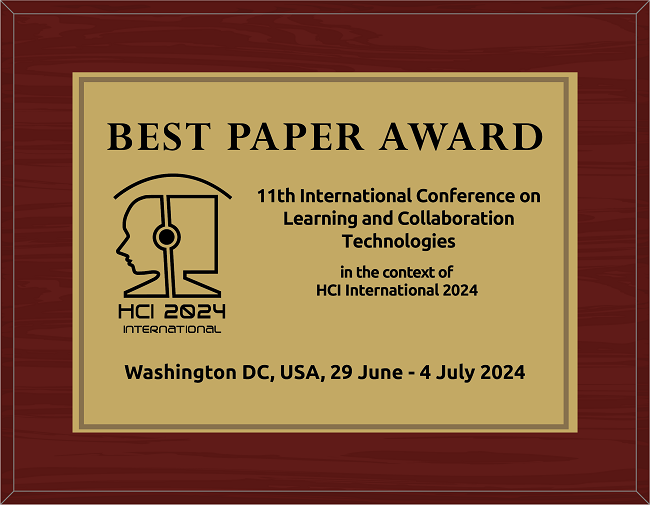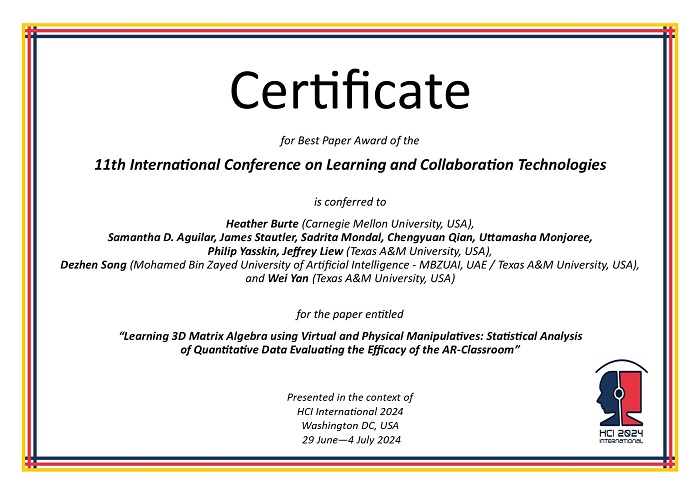
The Best Paper Award of the 11th International Conference on Learning and Collaboration Technologies
has been conferred to
Heather Burte (Carnegie Mellon University, USA),
Samantha D. Aguilar, James Stautler, Sadrita Mondal, Chengyuan Qian, Uttamasha Monjoree,
Philip Yasskin, Jeffrey Liew (Texas A&M University, USA),
Dezhen Song (Mohamed Bin Zayed University of Artificial Intelligence - MBZUAI, UAE / Texas A&M University, USA), and Wei Yan (Texas A&M University, USA)
for the paper entitled
"Learning 3D Matrix Algebra using Virtual and Physical Manipulatives: Statistical Analysis of Quantitative Data Evaluating the Efficacy of the AR-Classroom"

Samantha D. Aguilar
(presenter)

Best Paper Award for the 11th International Conference on Learning and Collaboration Technologies, in the context of HCI International 2024, Washington DC, USA, 29 June - 4 July 2024

Certificate for Best Paper Award of the 11th International Conference on Learning and Collaboration Technologies presented in the context of HCI International 2024, Washington DC, USA, 29 June - 4 July 2024
Paper Abstract
The Augmented reality (AR) allows digital information to be overlayed onto a physical plane that users can manipulate. Using the unique capabilities of AR, the AR-Classroom learning tool aims to teach three-dimensional (3D) geometric rotations and their mathematics using virtual and physical manipulatives. In an efficacy experiment, undergraduates completed pre-test measures of matrix algebra and spatial thinking skills, were assigned to interact with virtual (N = 20) or physical (N = 20) manipulatives in the AR-Classroom, or to complete active control activities (N = 20), and then completed post-test measures of matrix algebra and spatial thinking skills. Using a series of ANCOVAs, pre-test accuracy on matrix algebra and spatial thinking tests significantly predicted matrix algebra post-test accuracy. There were no significant group differences indicating that all three groups showed similar improvement in matrix algebra skills. Further ANCOVAs revealed that the virtual and physical conditions showed marginally significant improvements on matrix algebra questions that were taught by the AR-Classroom, specifically rotations and rotations combined with translations. These initial findings indicate that the AR-Classroom may aid students in improving their mathematical skills. Suggestions for future improvements to the AR-Classroom and efficacy experiments on the AR-Classroom are discussed.
The full paper is available through SpringerLink, provided that you have proper access rights.